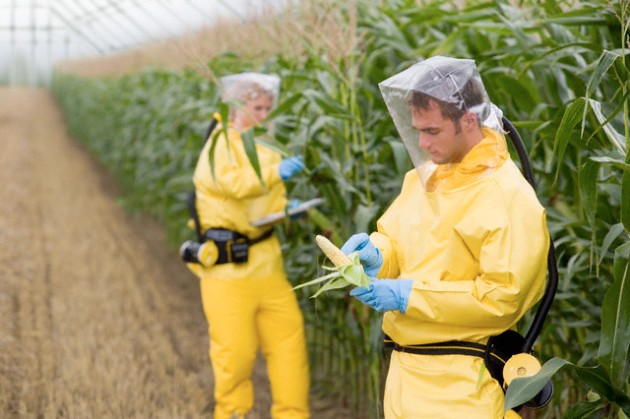
Joint press release: GeneWatch UK, Greenpeace UK, Friends of the Earth, GM Freeze, Soil Association (Monday 10th March 2014)
Environment groups today wrote to the Prime Minister and Deputy Prime Minister to condemn Environment Secretary Owen Paterson’s support for growing GM crops in Britain (1). Greenpeace, Friends of the Earth, GeneWatch UK, GM Freeze and the Soil Association expressed concerns that controversial RoundUp Ready GM crops might be planted in England as early as Spring 2015, leading to harm to the environment.
At the EU’s March Environment Council meeting, Paterson supported a proposal which would fast-track GM crops for commercial cultivation in pro-GM countries, whilst allowing anti-GM countries to opt out (2). The first GM crops in the pipeline for approval that are likely to be grown in England are Monsanto’s RoundUp Ready GM maize NK603 and Syngenta’s GA21. These crops are genetically engineered to withstand blanket spraying with the weedkiller glyphosate (brand name RoundUp). Monsanto has not withdrawn its application to plant NK603 in the EU, despite announcing in July 2013 that it would do so (3).
Previous plans to grow herbicide-tolerant GM crops commercially in the UK were abandoned in 2004, following the Farm Scale Evaluations (FSEs), which showed that blanket spraying with weedkillers destroys important habitats for birds, butterflies and other wildlife (4). These concerns have been borne out in reality in the United States, where widespread planting of RoundUp Ready crops has led to a drastic decline in numbers of the iconic Monarch butterfly, due to the destruction of the milkweed habitat where they lay their eggs (5). ‘Superweeds’ which have evolved resistance to RoundUp adversely affected nearly half of US farms surveyed in 2013, leading to major economic and environmental problems as spraying with other more toxic weedkillers has increased in response (6). Monopoly control over the seed supply, which is patented, has also led to major seed price hikes for farmers.
“Monsanto and other GM companies are desperate to push their GM crops into other countries before the devastating impacts on wildlife and farming destroy existing markets” said Dr Helen Wallace, Director of GeneWatch UK, “The Government should not be caving in to commercial lobbying and putting British birds and butterflies at risk”.
“The Soil Association hope that David Cameron does not want to be remembered as the Prime Minister responsible for the beginning of the end of organic farming in England. If GM crops spread, GM contamination will make organic farming impossible, and our growing organic market will have to be supplied with imported food”, said Peter Melchett, Soil Association Policy Director.
“British consumers don’t want to eat GM food and both Scottish and Welsh governments have made it clear they are opposed to GM crops. So why are our representatives in Westminster doing their level best to hand over control of our food and our natural environment to big business?” said Liz O’Neill, Director of GM Freeze.
“Ten years ago the UK Government reviewed the scientific, environmental and economic impacts of GM crops and food, and concluded they offered little benefit to the UK. Despite much huffing and puffing from its advocates, little has changed and the propositions on offer from the biotech industry are largely the same as they were. But the UK Government is so in thrall to industry hype that they want to deconstruct the EU single market – previously the only thing about Europe they wanted to keep – in order to grow GM crops that nobody wants”, said Dr Doug Parr, Chief Scientist, Greenpeace UK.
LINK: http://www.genewatch.org/article.shtml?als[cid]=492860&als[itemid]=574352






